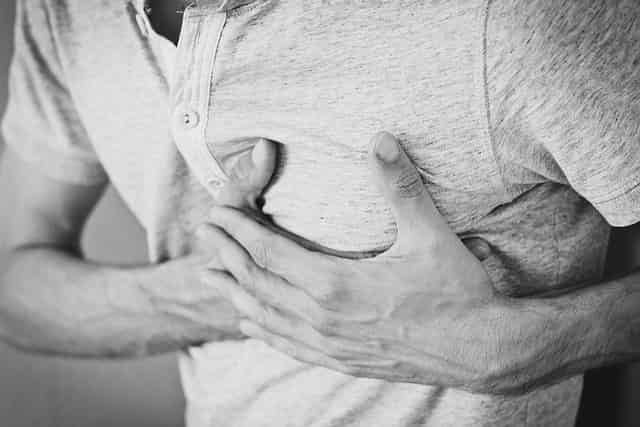Anxiety is a common mental health condition that affects millions of people worldwide. While anxiety can manifest in various ways, one of the most distressing symptoms is anxiety chest pain. We will examine the symptoms, diagnostics, and available treatments for anxiety chest pain test in this detailed guide. A thorough understanding of anxiety is essential for developing awareness and practicing good management, regardless of whether you are dealing with it yourself or are trying to help a loved one.
Definition
Anxiety is a natural response to stress or danger, described by feelings of apprehension, worry, and nervousness. While it’s normal to experience occasional anxiety in response to life’s challenges, prolonged or too high anxiety can disrupt with daily life and lead to various physical and emotional symptoms.
Symptoms
Anxiety manifests differently in each individual, but common symptoms include:
- Persistent worry or fear
- Restlessness or irritability
- Difficulty concentrating
- Muscle tension
- Fatigue
- Insomnia
- Rapid heartbeat or palpitations
- Shortness of breath
- Sweating or trembling
Anxiety Attack vs. Anxiety Disorder
Anxiety attacks, also known as panic attacks, are sudden episodes of intense fear or discomfort. These attacks can be damaging and often peak within minutes, causing overwhelming physical and emotional distress. In contrast, anxiety disorders involve persistent and excessive anxiety that significantly impairs daily functioning. Generalized anxiety disorder (GAD), social anxiety disorder, and panic disorder are among the most common anxiety disorders.
Anxiety Chest Pain
Anxiety chest pain refers to discomfort or tightness in the chest that occurs during periods of heightened anxiety. While anxiety chest pain can mimic symptoms of a heart attack, it typically arises from muscular tension and heightened stress rather than cardiac issues. Individuals experiencing anxiety chest pain test may describe sensations of pressure, squeezing, or aching in the chest area.
Anxiety Chest Pain Test
Diagnosing anxiety chest pain test often involves ruling out other potential causes, such as heart disease. Your healthcare provider may conduct a physical examination, review your medical history, and perform diagnostic tests such as:
- Electrocardiogram (ECG or EKG) to assess heart function
- Blood tests to check for cardiac enzymes and other markers of heart health
- Imaging tests such as chest X-rays or echocardiograms to evaluate heart structure and function
In addition to these medical anxiety chest pain tests, your healthcare provider may inquire about your anxiety symptoms and overall mental health to make an accurate diagnosis.
Symptoms in Women
While anxiety affects people of all genders, women are more likely to experience certain anxiety disorders, such as generalized anxiety disorder and panic disorder. Hormonal fluctuations, societal pressures, and life transitions such as pregnancy and menopause can contribute to heightened anxiety in women. Recognizing and addressing these unique factors is essential for providing targeted support and treatment.
Treatment Guidelines
If you or someone you know is struggling with anxiety chest pain test, consider the following guidelines for seeking treatment:
- Consult with a qualified healthcare provider to discuss your symptoms and develop a personalized treatment plan.
- Explore therapeutic options such as cognitive-behavioral therapy (CBT), mindfulness-based stress reduction (MBSR), and relaxation techniques.
- Prioritize self-care activities such as regular exercise, adequate sleep, healthy nutrition, and stress management.
- Consider joining a support group or seeking support from friends and family members who understand your experience.
- Be patient and compassionate with yourself throughout the recovery process, as healing from anxiety takes time and effort.
Medications
- Selective Serotonin Reuptake Inhibitors (SSRIs):
- SSRIs are among the most commonly prescribed medications for anxiety disorders. They work by increasing the levels of serotonin, a neurotransmitter involved in mood regulation, in the brain.
- Examples include fluoxetine (Prozac), sertraline (Zoloft), escitalopram (Lexapro), and paroxetine (Paxil).
- SSRIs are effective in treating generalized anxiety disorder (GAD), panic disorder, and social anxiety disorder.
- Serotonin-Norepinephrine Reuptake Inhibitors (SNRIs):
- SNRIs are another class of antidepressant medications that can help alleviate anxiety symptoms.
- In addition to targeting serotonin, SNRIs also affect norepinephrine levels in the brain.
- Common SNRIs include venlafaxine (Effexor XR), duloxetine (Cymbalta), and desvenlafaxine (Pristiq).
- Benzodiazepines:
- Benzodiazepines are sedative medications that work by enhancing the effects of gamma-aminobutyric acid (GABA), a neurotransmitter that inhibits brain activity.
- They are often used for short-term relief of severe anxiety symptoms or during acute anxiety episodes.
- Examples include alprazolam (Xanax), clonazepam (Klonopin), diazepam (Valium), and lorazepam (Ativan).
- Due to their potential for dependence and addiction, benzodiazepines are typically prescribed cautiously and for limited durations.
- Beta-Blockers:
- Beta-blockers are medications commonly used to treat high blood pressure and heart conditions. They can also be prescribed off-label to manage physical symptoms of anxiety, such as rapid heartbeat, trembling, and sweating.
- Propranolol (Inderal) is a beta-blocker frequently used for anxiety-related symptoms.
Non-Medication Treatments
- Therapy:
- Cognitive-behavioral therapy (CBT) is one of the most effective forms of therapy for anxiety disorders. It helps individuals identify and challenge negative thought patterns and develop coping strategies to manage anxiety.
- Other therapeutic approaches, such as mindfulness-based stress reduction (MBSR), exposure therapy, and acceptance and commitment therapy (ACT), may also be beneficial.
- Lifestyle Modifications:
- Engaging in regular exercise, maintaining a balanced diet, getting adequate sleep, and practicing relaxation techniques like deep breathing and meditation can help reduce anxiety symptoms.
- Avoiding caffeine, alcohol, and recreational drugs, which can exacerbate anxiety, is also important.
- Support Groups:
- Joining a support group or attending group therapy sessions can provide valuable emotional support and encouragement from others who understand your struggles with anxiety.
- Self-Care Practices:
- Taking time for self-care activities that bring joy and relaxation, such as hobbies, spending time in nature, and socializing with loved ones, can contribute to overall well-being and resilience against anxiety.
Anxiety Bookshelf
Educating yourself about anxiety can empower you to better understand and manage your symptoms. Here are some highly recommended books on anxiety:
- “The Anxiety and Worry Workbook: The Cognitive Behavioral Solution” by David A. Clark and Aaron T. Beck
- “The Anxiety Toolkit: Strategies for Fine-Tuning Your Mind and Moving Past Your Stuck Points” by Alice Boyes, PhD
- “Dare: The New Way to End Anxiety and Stop Panic Attacks Fast” by Barry McDonagh
- “The Anxiety Solution: A Quieter Mind, a Calmer You” by Chloe Brotheridge
Anxiety chest pain can be frightening and debilitating, but it’s essential to remember that help is available. By understanding the symptoms, Anxiety chest pain tests, and treatment options associated with anxiety chest pain test, you can take proactive steps toward managing your condition and improving your overall well-being. Remember, you are not alone in your journey, and with the right support and resources, you can overcome anxiety and reclaim control of your life.
Table
Certainly, here’s the table focusing solely on the types of anxiety disorders and their common causes:
| Anxiety Disorder | Common Causes |
|---|---|
| Generalized Anxiety Disorder | Genetic predisposition, childhood trauma or abuse, chronic stress, major life transitions, neurotransmitter imbalances. |
| Panic Disorder | Genetics, history of trauma or abuse, major life stressors, changes in brain function and chemistry, hypersensitivity to stress hormones. |
| Social Anxiety Disorder | Genetics, environmental factors, negative past experiences in social settings, low self-esteem, perfectionism. |
| Specific Phobia | Traumatic experiences or conditioning, genetic predisposition, learned behavior from observing others’ reactions. |
| Obsessive-Compulsive Disorder | Genetic factors, brain structure and function abnormalities, childhood trauma, learned behavior, environmental stressors, neurotransmitter imbalances. |
| Post-Traumatic Stress Disorder | Exposure to traumatic events, childhood trauma or abuse, genetic predisposition, lack of social support, pre-existing mental health conditions. |
This concise table provides an overview of the common causes associated with each type of anxiety chest pain test disorder, aiding in understanding the underlying factors contributing to these conditions.



